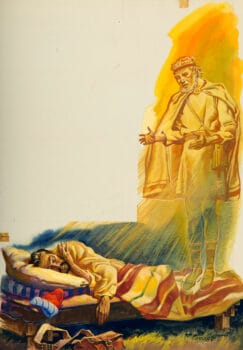Issachar understood the times and knew what Israel should do (1 Chronicles 12:32). So, how does that help us? How can we be like Issachar? Ellen White says we have nothing to fear for the future unless we forget how God has led us in the past (Christian Experience and Teachings, 204). Source: https://www.youtube.com/shorts/vtxEgW5liok
20210724 03
Tuesday: Paul in Philippi
Daily Lesson for Tuesday 30th of December 2025
During Paul’s second missionary journey, shortly after Timothy was added to the team, they are forbidden by the Holy Spirit to continue across Asia Minor (Acts 16:6). So, during a vision of the night, Paul sees a man pleading with him to “ ‘come over to Macedonia and help us’ ” (Acts 16:9, NKJV). So, immediately they head to the seaport nearest Macedonia and sail from Troas across the Aegean Sea to Neapolis, on the European continent. But rather than evangelize there, Paul, Silas, Timothy, and Luke, who joined them at Troas (as indicated by the use of “we” in Acts 16:11), head to Philippi.
In his evangelistic activity, Paul always thought strategically. Philippi was “the chief city of that part of Macedonia” (Acts 16:12). In fact, it was one of the most honored cities of the Roman Empire, being given the status of Ius Italicum—the highest possible designation a city could be granted. Its citizens had the same privileges as if the city were located in Italy, including exemption from the land tax and the poll tax, and anyone born in the city automatically became a Roman citizen. It was also an important stop along the Via Egnatia, which was the main overland road connecting Rome with the East. Establishing an important Christian presence there enabled them to bring the gospel to many other nearby cities, including Amphipolis, Apollonia, Thessalonica, and Berea (see Acts 17:1,10).
Interestingly, the official language in first-century Philippi was Latin, evidenced by the predominance of Latin inscriptions. In Philippians 4:15, Paul even addresses them with a Latin-sounding name, Philippēsioi, apparently in recognition of their special Roman status. Nevertheless, Greek was the language of the marketplace and of the surrounding towns and cities and the means by which the gospel was spread. Luke describes how Paul and his team joined people for prayer by the riverside, where Lydia and her household were converted (Acts 16:13-15). Being a businesswoman (“a seller of purple”), she would have been one of the major financial supporters in Philippi of Paul’s ministry. The time Paul and Silas spent in prison there led to the conversion of another entire household—that of the jailer.
The Holy Spirit knew that Philippi would be the ideal beachhead for the spread of the gospel through Europe, even though there would also be persecution. However evil it is, persecution can, in certain circumstances, enable the gospel to reach people who otherwise might not be reached.
Read Acts 9:16. How does this help us understand some of Paul’s trials? How might this help us understand some of our own? |
Tante Louise, la Bible ne dit-elle pas que les sapins de Noël sont un péché?

29 décembre 2025 | Chère tante Louise, Il y a quelques semaines, l’une de mes amies a quitté l’église en fanfare. Pour quelle raison? Quelqu’un (probablement les diaconesses) avait installé un magnifique sapin de Noël dans la salle de culte. Mon amie a déclaré que, selon la Bible et Ellen White, les sapins de Noël […] Source: https://atoday.org/tante-louise-la-bible-ne-dit-elle-pas-que-les-sapins-de-noel-sont-un-peche/
CCTV Footage Complicates Investigation Regarding the Alleged Indian Adventist School Stabbing

29 December 2025 | New details have come to light regarding the alleged stabbing at the Seventh Day Adventist High Secondary School in Ahmedabad’s Khokhra Maninagar area. The Class 10 student, who allegedly stabbed another student named Nayan Santani to death on August 19 has been in the custody of the Juvenile Justice Board (JJB) […] Source: https://atoday.org/cctv-footage-complicates-investigation-regarding-indian-adventist-school-stabbing/
- « Previous Page
- 1
- …
- 128
- 129
- 130
- 131
- 132
- …
- 8259
- Next Page »

